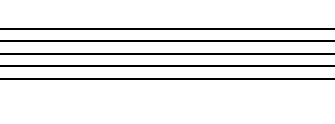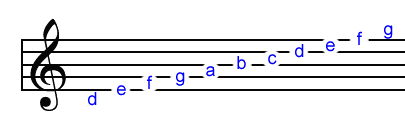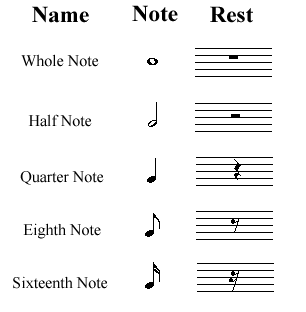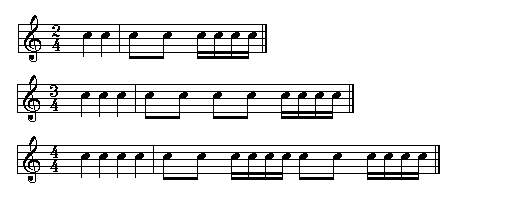|
|
|
|
|
|
|
|
|
 Posted: Sun Dec 03, 2006 7:24 am Posted: Sun Dec 03, 2006 7:24 am
 |
 |
 |
 |
Deoridhe missmagpie So how many people would like a post up here on how to read music? You can PM and tell me if you're too shy to say so on the thread. *jumps up and down waving her arms wildly* ^^
reagun ban Though, be warned, child I am a particulalry venomous type of Irish serpent. |
 |
 |
 |
 |
|
 |
 |
|
|
|
|
|
|
|
|
|
|
|
|
|
 Posted: Sun Dec 03, 2006 2:51 pm Posted: Sun Dec 03, 2006 2:51 pm
 |
 |
 |
 |
missmagpie MoonJeli (One comes to mind, an industrial piece actually, but I can't recall the band... it was also very minimalist, as far as popular music goes.) Steve Reich? And yes, much drumming is a good thing. 3nodding Being able to play talking drums properly is a pretty fantastic skill.
No, though his stuff is pretty weird in the way it affects me too. biggrin I looked it up and it was a German band, not classical, Einstürzende Neubauten. It certainly wasn't like their typical stuff.
I listen mostly to classical, myself, but my mom (who is almost 60) listens mostly to punk, industrial, alternative, heavy metal and the like. Heh. I got a lot of that as a kid, too.
Deoridhe You know, a CD exchange of "divine music" might be a good idea... not that I want to pirate anyone's collections, or anything. ninja Staneslovsky's "Firebird" was one of my first experiences of it, and after stumbling through the first part of Godel, Escher, Bach I discovered fugues and have never quite been the same since.
Do you mean music composed specifically with spiritual intent, or just music we experience as divine or inspired?
missmagpie You sure it's not Stravinsky's Firebird? I'm not sure there are that many ballets by the same name. And while we're at it, Stravinsky's Petrushka and The Rite of Spring are awesome. The Rite of Spring is a ballet of his take on a pagan festival. It's just fantastic... and was a huge flop when it first came out. Debussy wins greatness with La Mer and Prelude du l'apresmidi d'un faun. Oh, and Syrinx is great too, though perhaps of not as much interest to non flute-players. Elgar wrote some amazing choral stuff, The Dream of Gerontius perhaps being the most famous. Wagner's entire Ring Cycle, although hefty, is well worth a concentrated listen, and his other operas like Tristan and Isolde are quite good too. Going back further you're safe with pretty much anything by Mozart, in particular The Magic Flute. All Bach is unspeakably brilliant. He also tends to overshadow his contemporaries, such as Handel, whose flute sonatas and oratorios are quite wonderful.
I went to an all-Handel concert last night! It was wonderful and I've still got some of it in my head. I love in the third Suite of Water Music the chamber music bit with recorder and long-necked lute. Eee.
Bach supposedly said, "[Handel] is the only person I would wish to see before I die, and the only person I would wish to be, were I not Bach."
Beethoven is said to have exclaimed, "Handel is the greatest composer that ever lived. I would kneel bare-headed by Handel's grave."
missmagpie Um... It is a pretty impossible task to give someone a listening list. There is just so much out there! My advice is: If you've heard of something, listen to it. It's quite likely there's a reason you've heard of it. Even Handel's Messiah, so ridiculously overplayed, is so renowned because it's so bloody good!
When you go to college and are taking music history and theory and appreciation classes, it's trendy to dislike any popular stuff, i.e. Beethoven, Bach, Ravel, etc. and claim the only good stuff is either really old or really new, or unknown and avant-garde. Y'know, rebel. But then if you play some Ravel, those same people who are being snobby are going to be tapping their feet. wink
The reason it lasts and is well known is because it's brilliant.
Nnnngh, Messiah is definitely divine. Handel felt some sense of being divinely inspired writing it. He said, of composing it, "I did think I did see all Heaven before me and the great God Himself." And, of the Hallelujah Chorus, "Whether I was in my body or out of my body as I wrote it I know not. God knows."
And it's the holiday season, so now's an easy time to go find a performance of it. Live music is awesome.
missmagpie Also take care of certain editions. You can get some really bad recordings of this stuff, and that makes all the difference. ... There are a couple guides to classical CDs out there, such as Gramophone and Diapason. Except Diapason is in French so that might not be of much use to you...
I personally like Jim Svejda's irreverent take on it. It's very much on opinion thing and some classical music buffs would absolutely rip me (and Svejda) apart.
He's also hilarious. He wrote of Carmina Burana (a very popular piece), "This astonishingly simple, musically primitive setting of some bawdy medieval lyrics can be a dazzlingly effective experience … we are thoroughly convinced that this is music that a gland would write, if only it could." He then goes on to state that he loves it.
missmagpie I know I come from a privelaged musical background, but I find it amazing that so many people don't read music! It's just so weird to me because I learned to read music like I learned to read words; by the age of 4 I was spelling out stuff. I may have to write up something about reading music... There are also several good online tutorials on how to read. They tend to get a bit on the complicated side though. Click.Click. (Oooh! This one's got listening attached!) I might end up writing a tutorial to post here if there is much demand.
I'll try to read those, but I do demand! Please do write something up if you have time! |
 |
 |
 |
 |
|
 |
 |
|
|
|
|
|
|
|
|
|
|
|
|
|
|
|
 Posted: Sun Dec 03, 2006 3:16 pm Posted: Sun Dec 03, 2006 3:16 pm
 |
 |
 |
 |
MoonJeli When you go to college and are taking music history and theory and appreciation classes, it's trendy to dislike any popular stuff, i.e. Beethoven, Bach, Ravel, etc. and claim the only good stuff is either really old or really new, or unknown and avant-garde. Y'know, rebel. But then if you play some Ravel, those same people who are being snobby are going to be tapping their feet. wink
Quote: Nnnngh, Messiah is definitely divine. Handel felt some sense of being divinely inspired writing it. He said, of composing it, "I did think I did see all Heaven before me and the great God Himself." And, of the Hallelujah Chorus, "Whether I was in my body or out of my body as I wrote it I know not. God knows."
Quote: And it's the holiday season, so now's an easy time to go find a performance of it. Live music is awesome.
Quote: missmagpie Click.Click. (Oooh! This one's got listening attached!) I might end up writing a tutorial to post here if there is much demand. I'll try to read those, but I do demand! Please do write something up if you have time! |
 |
 |
 |
 |
|
 |
 |
|
|
|
|
|
|
|
|
|
|
|
|
|
 Posted: Sun Dec 03, 2006 3:28 pm Posted: Sun Dec 03, 2006 3:28 pm
 |
 |
 |
 |
missmagpie MoonJeli When you go to college and are taking music history and theory and appreciation classes, it's trendy to dislike any popular stuff, i.e. Beethoven, Bach, Ravel, etc. and claim the only good stuff is either really old or really new, or unknown and avant-garde. Y'know, rebel. But then if you play some Ravel, those same people who are being snobby are going to be tapping their feet. wink Meh. In my college course we're doing all the greats. People like avant-garde too, but you know they'll admit that Debussy's wicked. We have a contemporary music class as well in which we do all sorts of fun stuff. And my lecturers listen to everything from Wagner to Messaein. We're currently analysing Beethoven piano sonatas. You can't do a music course without the greats.
I meant snobby students trying to be cool in front of their peers and trying to be more sophisticated than their teachers. wink They usually get over it by the time they're out of school. I saw tons of kids sitting through the course, absolutely soaking it all up, but pretending to be indifferent. Maybe that trend has gone out of favor these days. |
 |
 |
 |
 |
|
 |
 |
|
|
|
|
|
|
|
|
|
|
|
|
|
|
|
 Posted: Mon Dec 04, 2006 5:19 pm Posted: Mon Dec 04, 2006 5:19 pm
 |
 |
 |
 |
TheDisreputableDog missmagpie Maybe I'm stupid but it doesn't seem to be working. Maybe there's something wrong with the file? I dunno. Thanks for working on it anyway! I really think midi is such a pain in the a** so I really appreciate it! Boo. It was working for me. I'll see what's up. There's another thing I can use. |
 |
 |
 |
 |
|
 |
 |
|
|
|
|
|
|
|
|
|
|
|
|
|
 Posted: Mon Dec 18, 2006 3:29 pm Posted: Mon Dec 18, 2006 3:29 pm
 |
 |
 |
 |
How to read music: Part One
Introduction
Reading music has two parts: Pitch and rhythm. Similar to words and grammar, a sentence won’t make much sense without both.
Pitch
Music is notated on a staff. This is the thing with five lines that looks like this:

Musical pitch is read by where the notes are placed on this staff.
At the beginning of a line of music will be a clef. This tells you what the lines and spaces mean. The treble clef is the most common and looks like this:

The treble clef is a very stylised letter G, and as you can see, it circles around the G above middle C. It gives the individual lines and spaces their pitches, so that the note makes sense when it sits on them.
There are all sorts of tricks to remember where the notes are on the treble clef. The lines in the treble clef, going up from the bottom, make the little mnemonic device:
Every Good Boy Deserves Fudge
And if you read up the spaces from the bottom they spell the word F A C E.
So a note on the second line up from the bottom is the G above middle C, or g' (see previous posts for explanation of the Helmholtz system). A note in the space above it is a'.
The bass clef looks like this:

These two clefs deal with different registers. On the bass clef, the line between the two dots is the F below middle C.
These two clefs are often put together on a grand staff.

As you can see, they cover different registers. These are often used in tandem, especially in piano music.
Finally, we need to talk about ledger lines. Ledger lines are used as extenstions of the staff when the music goes higher or lower than it. They are drawn as little lines parallel to the staff, and contain one note.
 So the music can go even higher or lower than the staff's boundaries. So the music can go even higher or lower than the staff's boundaries.
Here is an example. See if you can figure out what the notes are.

Don't worry about the rhythms yet.
Answers: E F G A F A D C A G F D F
It's actually the first few bars of Danny Boy
|
 |
 |
 |
 |
|
 |
 |
|
|
|
|
|
|
|
|
|
|
|
|
|
|
|
 Posted: Mon Dec 18, 2006 4:08 pm Posted: Mon Dec 18, 2006 4:08 pm
 |
 |
 |
 |
How to read music: Part Two
Rhythm
This is where I run into the difficulty of of trying to teach without you guys being able to hear. But I'll give it my best shot.
The fundamental aspect of any musical piece is rhythm. Rhythm came first. In fact, every single indigenous culture around the world has invented some sort of percussion instrument, and I would say with confidence that the first instrument ever invented was the drum.
Listen to a song with a strong beat. Can you tap your foot to it? If not, try tapping to a clock or metronome. What you are tapping is a beat. In classical music, beats are corralled into bars. There are a certain number of beats per bar.
Rhythm is notated by symbols with differing values.

The longest note is a whole note. This note has a duration of four beats. The next is a half note, which is half as long as a whole note. It is held for two beats. The quarter note is one beat long. The eighth note is half of a beat, the sixteenth a quarter of a beat. Pretty self-explanatory, eh? That's the American nomenclature.
The European equivalent names are:
Whole note = Semibreve
Half note = Minim
Quarter note = Crotchet
Eighth note = Quaver
Sixteenth note = Semiquaver
(I never understood why they had to make them more complicated.)
The rests just mean you do not play/sing for that amount of time.
Try this exercise. Establish a steady beat, ie. tap your foot, clap your hands, get a loud clock or find a metronome. By that beat, start counting "One, two, three, four, one, two, three, four, etc." Then hum a whole note (four beats). Then hum two half notes (two beats each). Then four quarter notes. Then eight eighth notes (remember, two eighth notes make a quarter note) and sixteen sixteenth notes. Doing the whole exercise in succession will show you how the rhythmic system is structured.
On to reading rhythm. Classical music is structured into bars. A bar is shown by a line straight down through the staff. There are a certain number of beats per bar. This is notated by the time signature:

Time signatures are composed of two numbers, and sit at the beginning of every piece of music. The top number tells you how many beats are in a bar. The bottom number tells you what value the beat is. In the first example there are two beats in every bar, and it's counting in quarter notes. So every beat is a quarter note. This is shown by the four on the bottom of the time signature. In the second example there are three beats in the bar, and each beat is a quarter note. In the third example there are four beats in the bar, counting in quarter notes. This is by far the most common time signature, up to the point where it's just called Common time and signified by a "C" where the time signature should be.
So you ask, why bother with the bottom number? This is because you can count in different denominations of rhythm. For example, it is possible to count in half notes, so the bottom number would be a two. This would mean that every beat is a half note. Whole notes would then be two beats long, and quarter notes would be half a beat. Alternatively, if you had a time signature with an eight on the bottom you'd be counting in eighth notes. Every beat would be an eighth note. That would make quarter notes two beats long.
Note: Eighth notes in close proximity are often stuck together with a line, or beam. Sixteenth notes have two beams.
So here's a rhythm exercise:

Count out the bottom numbers vocally, and play or clap the rhythm.
Hint: It's to the rhythm of "Jingle Bells."
When you get the hang of that, try clapping this one:

Remember, there are two quarter notes to a beat here.
|
 |
 |
 |
 |
|
 |
 |
|
|
|
|
|
|
|
|
|
|
|
|
|
 Posted: Mon Dec 18, 2006 5:13 pm Posted: Mon Dec 18, 2006 5:13 pm
 |
 |
 |
 |
How to read music: Part Three
This is where you put rhythm and pitch together. Now remember, like everything, reading music comes with practise. Sight reading for a lot of people, even musicians, can be really difficult. So don't get frustrated if you think it's hard. Practise. You'll get better.
I would highly recommend some sort of instrument for this part. There is a free online piano here.
If it helps, work out the note names first and write them down. Make sure when you're playing to have a steady beat in your head. Go slowly, and don't forget to count.
Exercise One

Play.
Hint 1: Work out the pitches slowly and write them over the notes. Don't forget to count!
Hint 2: c e f g c e f g c e f g e c e d
Hint 3: It's When the Saints Go Marching In
Exercise Two

This one's even easier.
Hint 1: g g g d e e d b b a a g
Hint 2: It's Old Macdonald had a farm...
Exercise Three

This one has something new: Dotted notes. A dot after a note makes it half again as long. So the dotted quarter note in bar three is actually a beat and a half long. The dotted half note later is three beats long. Try playing it.
Hint 1: It has three beats in a bar
Hint 2: d d a a e f e d (quarter note rest) a c d c a b g a
Hint 3: It's the first few bars of Scarborough Fair
Exercise Four

Hint 1: e g g e g a g e e d (rest) e d g g g
Hint 2: It's The Camptown Races
Exercise Five
For those of you who are really adventurous...

Hint 1: It's all about rhythm...
Hint 2: a aa a aa a d f a
g gg g gg g c e g
a aa a aa a b c d
c a g e d- d-
Hint 3: What shall we do with the drunken sailor?
For further practise, picking up any beginner recorder books can be a good help. I know the recorder is a terribly abused instrument, but it can be very good practise to sightread and play the easy songs they give you in beginner books. Besides, the recorder is a relatively easy instrument to get a coherent sound on.
There are also plenty of books and websites on music theory that you can look up. Here is a good one.
Music Theory
Music Theory
Music Theory (Now with Flash!)
|
 |
 |
 |
 |
|
 |
 |
|
|
|
|
|
|
|
|
|
|
|
|
|
|
|
 Posted: Mon Dec 18, 2006 5:17 pm Posted: Mon Dec 18, 2006 5:17 pm
|
|
|
|
|
|
|
|
|
|
|
 Posted: Mon Dec 18, 2006 5:44 pm Posted: Mon Dec 18, 2006 5:44 pm
|
|
|
|
|
|
|
|
|
|
|
|
|
 Posted: Tue Dec 19, 2006 8:56 am Posted: Tue Dec 19, 2006 8:56 am
|
|
|
|
|
|
|
|
|
|
|
 Posted: Tue Dec 19, 2006 10:38 am Posted: Tue Dec 19, 2006 10:38 am
|
|
|
|
|
|
|
|
|
|
|
|
|
 Posted: Tue Dec 19, 2006 10:44 am Posted: Tue Dec 19, 2006 10:44 am
 |
 |
 |
 |
Deoridhe missmagpie Anyone else find that making music gives you more energy? Absolutely, especially difficult things. For instance, I hit the high not in Sarah McLachlan's Fear for the first time today cleanly and it felt like a drug rush. |
 |
 |
 |
 |
|
 |
 |
|
|
|
|
|
|
|
|
|
|
|
|
|
 Posted: Sun Dec 24, 2006 5:36 am Posted: Sun Dec 24, 2006 5:36 am
 |
 |
 |
 |
Deoridhe missmagpie Anyone else find that making music gives you more energy? Absolutely, especially difficult things. For instance, I hit the high not in Sarah McLachlan's Fear for the first time today cleanly and it felt like a drug rush.
And it's better than any drug rush when you get them all perfectly. 4laugh |
 |
 |
 |
 |
|
 |
 |
|
|
|
|
|
|
|
|
|
|
|
|
|
|
|
 Posted: Tue Dec 26, 2006 6:45 pm Posted: Tue Dec 26, 2006 6:45 pm
 |
 |
 |
 |
Henry Dorsett Case Deoridhe missmagpie Anyone else find that making music gives you more energy? Absolutely, especially difficult things. For instance, I hit the high not in Sarah McLachlan's Fear for the first time today cleanly and it felt like a drug rush. I drive better to that song. I clean better. I play Geometry Wars better. Hell, I just feel better when I sing along with that specific song. There are a few others like that, but what's strange is that most of my "energy music" is instrumental epic trance or some other form of techno...
When I'm in the mood and actually crank out good music, it definetaly gives me energy and makes me feel very happy. I used to listen to a lot of Ibiza/Tribal trance music which gives this rejuvenating effect when I relax and focus solely on it, but...recently I've been getting into Industrial. Nothing very rejuvenating about it sweatdrop |
 |
 |
 |
 |
|
 |
 |
|
|
|
|
|
|
|
|
 |
|
|
|
|
|
|









 So the music can go even higher or lower than the staff's boundaries.
So the music can go even higher or lower than the staff's boundaries. 








